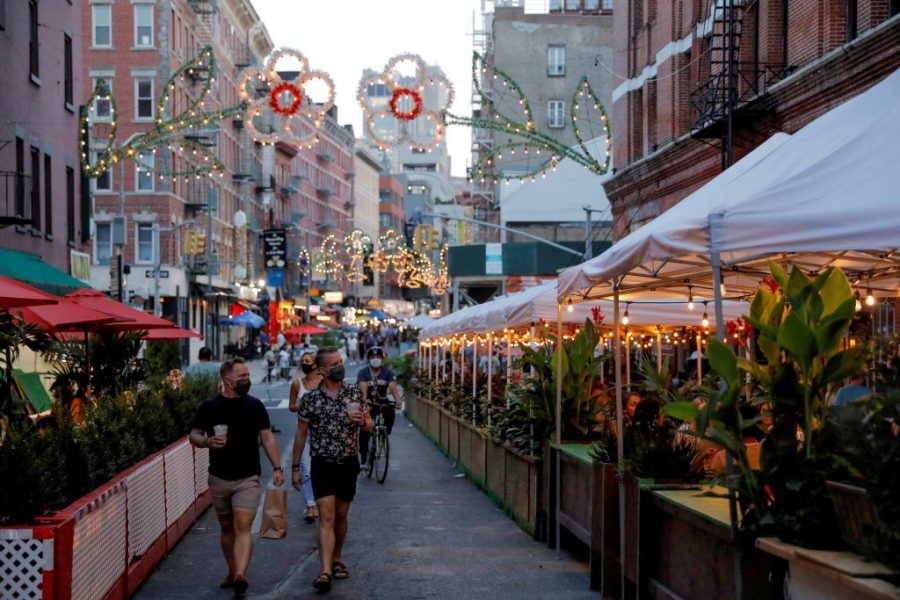N.Y.C. Restaurants Will Not Survive the Winter Without Assistance
Eating next to heat lamps or inside of bubble-like structures, labeled yurts, in the streets of New York City is the new norm. This will continue throughout the winter, as the city extends outdoor dining to year-round, giving restaurants a final lifeline to escape their debt. However, most restaurants, even with the extension of outdoor dining, need more financial assistance from the government if they plan on making it through the winter. Unfortunately, it appears that some restaurants are not getting the assistance they require.
The Open Restaurants Program has granted “more than 10,300 restaurants citywide” permission to host outdoor dining with tables on sidewalks and streets to give these businesses some type of income, but even with the opening of outdoor dining, restaurants continue to struggle due to the lack of office workers and tourists. This program had a scheduled deadline of Oct. 31, but Mayor Bill de Blasio has since extended this program to year-round. Without this expansion, restaurants would be left only with indoor dining through the winter, which, due to limited capacity, would put restaurants in deeper financial trouble. The extension of this program is a good start, but the government needs to do much more if restaurants are going to survive the winter.
Just outside of Fordham’s Rose Hill campus, Arthur Avenue has transformed itself in order to stay afloat. Streets have been closed off in order to accommodate the 22 restaurants that have established outdoor dining spaces for their customers. On a nice evening, these restaurants will have lights hanging and plants all around, hosting hundreds of people from surrounding areas. This brings back the financial buzz Arthur Avenue has desperately been missing, but such nice evenings are quickly dwindling as we approach November and December.
The owner of Nomad, Mehenni Zebentout, voiced his doubts. “We’re just hoping for some miracle,” he said. “I believe, according to my experience, two out of three restaurants will close by December, and I’ll be one of them if there’s no help from the city or the government.” Andrew Schnipper, owner of four Shnipper’s restaurants across New York City prior to the pandemic, had to close two locations temporarily and one permanently, but says he was one of the luckier restaurants. He explained, “Schnipper’s had a robust takeout and delivery business before the pandemic.” He said that although he “received money through a government relief loan,” his business has still gone down 85%. Mr. Shnipper believes that restaurants would go out of business one after another “without rent help from the city and state,” adding that “reopening for indoor dining at 25% capacity would do little” due to the fact that most of the city remains quiet.
Currently, federal aid through the Paycheck Protection Program, “which was meant to help preserve worker’ jobs” and “offset some costs,” has mostly run dry. At the same time, restaurants’ inability to pay rent has set their landlords, who are responsible for their own bills, behind. Without government financial assistance, the future looks grim for many restaurants.
Outdoor and limited indoor dining brings in only a fraction of the income these restaurants would normally have. Restaurants are struggling to pay rent, let alone make a profit, and many workers have been let go because owners simply cannot afford to keep them employed. Andrew Rigie, executive director of the Hospitality Alliance, said keeping outdoor dining open is important, but more needs to be done. Rigie called for additional measures such as “federal aid for restaurants to cover their rents, payroll and operating costs, and city legislation to provide rent relief and other tenant protections from restaurants.” It is clear that in order for restaurants to stay afloat, the government of New York City has to do more than just allow them to continue outdoor dining during the winter.
If restaurants truly mean as much to the city as politicians and officials say they do, then there must be government aid in helping them out of their debt, or by December, most restaurants will be closed.
Cory Bork, FCRH ’23, is a communications and culture major from Robbinsville, N.J.

Cory Bork is a senior majoring in communication and culture with a minor in marketing. Beginning in his sophomore year, Cory wrote articles extensively...










































































































































































































